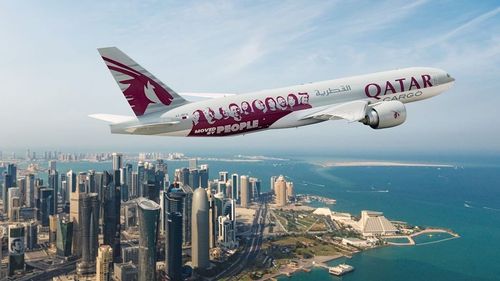Formula 1 expands SAF investment through new Qatar Airways program

SOURCE: Formula 1
December 9, 2024
BY Formula 1
Formula 1 has announced it is expanding its investment in sustainable aviation fuel (SAF) through a new program developed with Global Partner Qatar Airways.
The expansion builds upon the previously announced investment alongside Global Logistics Partner DHL, and creates a broader framework for F1 teams and the FIA to participate.
In total, the combined investment in the two program this year will reduce related emissions by more than 8,000 tCO2e (metric tons of carbon dioxide equivalent), an approximate 19% reduction in related emissions – compared to traditional aviation fuel – for the air freight charter program operated by Formula 1 across the flyaway events of the 2024 season.
The investment in SAF is a key part of Formula 1’s ultra-efficient logistics strategy and will be significant in keeping the sport on track to meet its Net Zero by 2030 commitment, which requires at least a 50% reduction in emissions versus the 2018 baseline.
What is SAF and why is Formula 1 investing in it?
This agreement also sees F1 become the inaugural member of Qatar Airways’ SAF program as the airline enters the next phase of its sustainability journey.
Advertisement
Advertisement
The program is a major milestone for the eight-time Airline of the Year, enabling its partners, like Formula 1, to leverage the benefits of SAF for the first time, and puts the airline and its stakeholders on the path to advance the use of SAF at commercial scale.
In 2024, the Qatar Airways Group completed an additional purchase of SAF for use in its fleet, which has resulted in reduction of 19,000 tCO2e.
SAF demonstrates Formula 1’s ongoing shift towards alternative fuels across all aspects of the sport. On track, the cars will use 100% advanced sustainable fuel from 2026, with F2 and F3 reaching this standard by next season, having been at 55% since the start of 2023. The FIA Safety and Medical Cars also currently use 40% advanced sustainable fuel.
Off-track, European Grands Prix have been delivered using biofuel-powered trucks since 2023 and, starting next season, key operational areas at all European Grands Prix – such as the pit lane and paddock – will be powered by a lower-carbon solution provided by Aggreko, reducing emissions in these areas by more than 90%.
Globally events across the calendar continue to increase the use of alternative energy solutions, such as biofuels, green tariffs and on-site renewables in their operations.
The agreement sees Formula 1 become the inaugural member of Qatar Airways’ Sustainable Aviation Fuel program.
Advertisement
Advertisement
SAF is a core part of Formula 1’s alternative fuel strategy and its use will be extended in future alongside the steps already taken to address its travel and logistics footprint.
F1 is rationalizing the championship calendar where possible to create a better flow of races, including the recent announcement that from 2026 Canada will move to a slot in May, whilst Monaco will move to June.
The sport is also utilizing regional hubs in Europe, UAE, and the US to reduce the distance freight travels between events, and using redesigned cargo containers to fit on to more efficient Boeing 777 aircrafts, reducing emissions by 17%.
Ellen Jones, Head of ESG at Formula 1, commented: “Today’s investment is the next step in our alternative fuels strategy which is central to delivering our Net Zero 2030 target.
“Through collaboration with our teams, the FIA and our partners, we are delivering on our promises to drive down the sports’ carbon emissions and drive forward technologies that can have an impact beyond Formula 1.
“This is the latest example of how stakeholders across the sport are aligned with our vision for a more sustainable F1, which we are thrilled to see.”
Related Stories
MOL Group has produced a diesel fuel containing hydrotreated vegetable oil (HVO), and sustainable aviation fuel (SAF) at the refinery of Slovnaft in Bratislava. The quality of the products has been verified by radioisotope analysis.
More than 1.76 billion renewable identification numbers (RINs) were generated under the Renewable Fuel Standard in January, down from 1.91 billion generated during the same period of 2024, according to data released by the U.S. EPA on Feb. 20.
The U.S. EPA on Feb. 20 released updated small refinery exemption (SRE) data showing that 13 previously denied SRE petitions for Renewable Fuel Standard compliance years 2021 and 2022 are being reconsidered. No new SRE petitions were filed.
OMV Petrom has announced the start of construction for a sustainable aviation fuel (SAF) and renewable diesel (HVO) production unit at the Petrobrazi refinery in Romania. The new facility will have an annual capacity of 250,000 tons.
CVR pauses development of potential SAF projects pending regulatory, tax credit clarity
CVR Energy Inc. released fourth quarter financial results on Feb. 18, reporting reduced renewable diesel production. The company also said it is pausing development of SAF capacity pending clarity on government subsidies.
Upcoming Events










